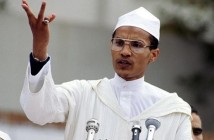By Leila Hanafi, MoroccoTomorrow Organizing Committee Member
Views Expressed in MoroccoTomorrow opinion columns are the views of the writer and not of MoroccoTomorrow
July 1st marks a historical milestone in Morocco’s efforts in building the rule of law and entrenching the mechanisms of good governance. In a widecast survey of support from the international community, the United Nations (UN) Secretary-General commended the people and the Government of Morocco for the peaceful manner in which they have been conducting the national process of political reforms.
As Moroccans from Rabat to Washington herald to the polls to cast their vote, their aspirations are the same: a call for a reform process which will concretely respond to the legitimate demands of the people. For youth (more than 50% of the population), this is an opportunity to engage in the reform process through dialogue and participation and without any resort to violence. In a recent speech to announce the new Moroccan Economic and Social Council, King Mohamed VI highlighted the need to revamp the economy to create more opportunities for the youth and encourage their public involvement. The fact that the King stressed his desire to “forge ahead with the Moroccan model” is a clear reflection of the deep, mutual understanding and cohesion between the throne and the people.
The situation in Morocco offers important opportunities to re-focus rule of law efforts on the achievement of concrete results that contribute to areas that matter most to citizens, in particular job and wealth creation, access to basic services, and the reinforcement of citizens’ capacity to defend their legal rights and exercise control over governmental activities to ensure that: justice institutions and procedures do not allow exceptions and provide equal treatment for all.
Martin Luther King, Jr., in his famous “I Have a Dream” speech, referred to Abraham Lincoln’s Emancipation Proclamation that set the slaves free as a proclamation that “came as a joyous daybreak to end the long night of captivity” (M.L. King speech, 28 August 1963). The referendum is that daybreak in Morocco. If the amended constitution is approved, it would constitute a decisive historic transition in the process of the building of the rule of law and democratic institutions. Its passage will satisfy the demand of ordinary people for freedom, fundamental rights, dignity, transparency, political reforms, democracy, free elections, and justice.
Rule of Law Developments in Morocco
Morocco has initiated major reforms in social, economic, and political fields and made significant headway in the area of judicial reforms which go beyond the judiciary and encompass the entire justice system, following an inclusive multidisciplinary approach. As stated by the League of Arab State, Morocco’s pioneering justice reforms in the areas of judicial ethics and modernizing institutional administrative structures, are considered a model for judicial reforms in the Middle East and North Africa region. Furthermore, the 2004 reform of the Moroccan Family Law, the Moudawana, is just one of the many examples of how societies grapple with balancing the ideals of tradition, justice and rule of law with the imperative of making society safer and more just for its citizens. Finally, Morocco’s Human Development Initiative is unquestionably a landmark in Morocco’s recent human and social development history, as it gives top political priority to people’s living conditions (especially youth and women) and their access to basic social infrastructure and services.
Morocco’s Fight against corruption
In the area of anti-corruption, Morocco’s efforts in promoting transparency have been, in recent years, the backbone of the government most important socio-economic strategic policy. This policy made of Morocco a leading regional country in curtailing corruption. The setting up of an inter-ministerial committee the Central Authority for the Prevention of Corruption (ICPC) in 2007, to stand as a watchdog and oversee the government actions against corrupt practices was a step forward in honoring the country’s commitments and implementing its strategic political choices for the consolidation of democracy and the rule of law.
No wonder then why Morocco was chosen by the international community to host the 4th anti-corruption conference of the countries party to the UN Convention against Corruption (UNCAC). Such a choice, plainly expressed in the 3rd Conference, held in Doha, in November 2009, is the international community’s recognition of Morocco’s reform processes.
Moving Forward
Despite improved legislations in Morocco, there are obstacles involving enforcing legislations that are often challenging. There are cultural norms, tradition, and lack of knowledge of legal rights in the rural and sometimes urban areas that may prevent people from invoking their rights. According to the recently released Rule of Law Index2, Morocco displays certain strengths and challenges to strengthening the rule of law. Some weaknesses remain in the areas of government accountability and regulatory enforcement. The assessment of the civil justice system remains average-ranking 46th overall and 7th out of 16 lower-middle income group countries-and the criminal justice system displays flaws with regard to the due process of law.
Government action alone is generally not enough to advance the rule of law. With a collaborative commitment by all stakeholders in Morocco, the rule of law can and will broaden the range of legal aid services to all segments of the populations; strengthen citizens’ capacity to defend their legal rights and exercise control over governmental activities; and prevent and combat government corruption. A multidisciplinary and respectful dialogue will inspire concerted actions and meaningful progress in ushering a new era of participatory democracy in Morocco.
1Throughout this article, Rule of Law will be defined based on four principles as established by the World Justice Project: 1) governments and their officials and agents are accountable under the law; 2) laws are clear, publicized, stable and fair, and protect fundamental rights, including security of persons and property; 3) the process by which laws are enacted, administered and enforced is accessible, fair and efficient; and 4) access to justice is provided by competent, independent and ethical adjudicators, attorneys or representatives and judicial officers who are of sufficient numbers, have adequate resources, and reflect the makeup of the communities they serve <www.worldjusticeproject.org>
2The WJP Rule of Law Index™ is a new quantitative assessment tool designed by the World Justice Project to offer a detailed and comprehensive picture of the extent to which countries adhere to the rule of law in practice. The Index provides detailed information and original data regarding a variety of dimensions of the rule of law, which enables stakeholders to assess a nation’s adherence to the rule of law in practice, identify a nation’s strengths and weaknesses in comparison to similarly situated countries, and track changes over timehttp://www.worldjusticeproject.org/rule-of-law-index/







